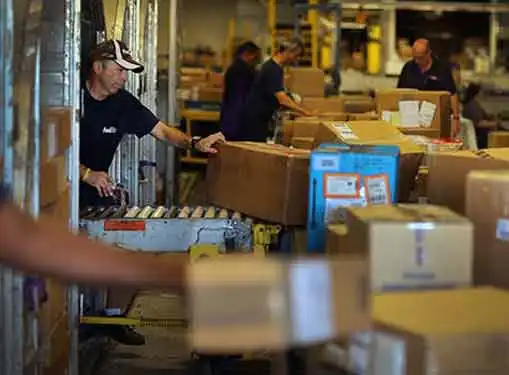Small Business Finance News
Economy Suffers Due To Antiquated De Minimis Shipping Threshhold
Written by Tim Morral
Published: 4/23/2014
Outdated tax policy for international orders of more than $200 is hurting the economy by bogging down the U.S. supply chain, discouraging small business exports and restricting economic growth.
When you place an online order totaling more than $200 from another country, the bureaucrats kick into gear.

Writer Philip Finiello of Free Enterprise ordered a suit for just over $200 from an international vendor. He was surprised to find that his merchandise came with an additional tab: $35 extra for duties and customs, equating to a 15% tax surcharge.
If the suit had cost less than $200, there wouldn't have been any surcharge.
That's because anything bought at or below the magical price point of $200 is not subject to duties and formal customs procedures. Anything above $200 gets incrementally taxed and must navigate a quagmire of customs hurdles before it lands on your doorstep.
Why $200? Well, back in the mid-1990s the United States set the "de minimis" shipping limit to $200. The world has changed dramatically in the ensuing two decades, but the de minimis threshhold remains stuck in a time warp.
The major change is the emergence of B2C e-commerce. It's now very common for consumers to buy high-value products online. But the low de minimis threshhold discourages suppliers from selling products over $200 across international borders. When they do sell items over $200, suppliers incur additional costs. Needless to say, those costs are getting passed on to consumers.
The net impact of our archaic de minimis value is that it slows down the economy and drives up the prices of merchandise. Fewer jobs and less money for rent and groceries -- all because of a fairly arbitrary value that was created ages ago, just as the World Wide Web was emerging into the mainstream.
The antiquated de minimis value was a hot topic at this week's NAFTANEXT conference in Chicago, where international leaders from government and private industry are debating the future of freight, energy and environmental infrastructure.
Across the country, there's a movement afoot to raise the de minimis value to $800 or $1,000. A higher de minimis value would reduce costs to consumers and increase the profit margins of businesses large and small. But unfortunately, Congress isn't taking the change seriously..
The economics behind the de minimis issue are straightforward. When economies move faster, they grow faster. Anything that slows down a supply chain inhibits the velocity of money changing hands, which is effectively the biggest driver of economic growth. That's why many economists and experts support raising the de minimis limit: it will eliminate the lengthy and burdensome import-export filing and compliance requirements that currently slow down shipments and discourage many businesses from even attempting to export their products.
An inconvenient downside is that Customs officials would have reduced workloads--a worrisome detail for folks who are employed by Customs. But the flip side is that changing the de minimis value would allow Customs officials to focus more time and effort on fraud, counterterrorism, intellectual property infringements, safety and a host of other issues.
However, the real loser would be taxing governments who are more than happy to slap an import tax on a package that is priced at over $200. The U.S. is not alone in setting its de minimis limit too low. If the U.S. raises its limit, other nations will likely have to follow suit and that's not likely to happen without a fight because no countries are eager to sacrifice tax revenues.
These arguments aside, it's absolutely time to raise the de minimis, ideally to $1,000.
A $1,000 de minimis value will be a boon to e-commerce companies who would love to have more international buyers. It would also benefit consumers, allowing them to finally have access to the international goods they want, at lower prices.
But even more importantly, raising the de minimis limit would benefit small businesses that want to grow and diversify their revenue sources through export sales. It's important to note that the Obama administration's National Export Initiative (NEI) has established a goal of doubling U.S. exports and creating 2 million U.S. jobs through export promotion. The current de minimis limit is clearly one of the obstacles that is standing in the way of increased small business exports.
The proposal to raise the de minimis limit has the backing of large logistics companies, the U.S. Chamber of Commerce, the American Association of Exporters and Importers, the National Association of Manufacturers, and the U.S. Council of International Business.
Yet, despite broad backing, Congress doesn't seem to care.
It may be that this issue seems too small for Congress to address, given the more pressing matters that perpetually consume their legislative focus. But this is a simple change that is good for small business, consumers and the overall economy.
So enough with the delays -- let's get this changed and eliminate an antiquated obstacle to economic growth.
Share this article
About Our Small Business News
Our small business writers cover all aspects of entrepreneurship. Our perspective is all about giving you news you can use to be a successful entrepreneur.
Additional Resources for Entrepreneurs
